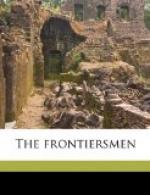As the loitering southern winter had been long in abeyance, many of the Cherokees of Citico Town were still in their airy summer residences, but in one of the conical “winter houses,” stove-like, air-tight, windowless, plastered within and without with the impervious red clay of the region, after the fashion of the great rotunda, Tscholens, in view of his sudden seizure and complaint of the gentle breeze of the south as freighted with the chill of the north, was consigned to rest. Half a dozen Cherokee braves were detailed to accompany him, nominally as a guard; but, there being no menace, this was in recognition of his importance and distinction, his escort of Delaware Indians having been billeted about in the town. There was no chimney, and although the fire which burned in the centre of the clay floor exhaled but little smoke, it hung in the air for the lack of the means of escape, and seemed to add to the warmth which the fuel sent forth. Now and again the superfluity of ashes encroached on the live coals. Whereupon one or another of the occupants of the restricted apartment, silent and recumbent upon the cane divan, which served now as bed and extended all ground the room between the walls and the row of posts that upheld the roof, would reach out a long stick, furnished for the purpose to each sleeper, and touch off the incumbering ash from the glow of the embers. As the night wore deeper into the dark hours these intervals of waking were rarer.
Tscholens, muffled in bed draperies of otter furs and feathered mantles, his cane-wrought couch softened with panther and wolf skins, heard the wind going its rounds, and he realized that the direction of the currents of the air had veered and it came straight from the north. With the mere suggestion his heart sank. How should he return whence it came?—baffled, denied, empty-handed!—from these specious Cherokees, who yet called the Lenape “grandfather.”
The young war-captain had divined since he had been among them that the Cherokees were making ready for war against the British government; they would attack the South Carolina colonists, and for this reason, if for no other, they would do nothing to anger the Mengwe, the Iroquois, whom, however, they had often fought: for they loved war—they loved war!
Gradually the room grew less warm. A sudden stir sounded under the divan, and a dog presently crept out to the fire, stretching lengthily and yawning widely as he went. He bestowed himself in an upright posture by the coals and looked down with drowsy gravity at the glow. His pendant ears, his long, pointed muzzle, his upright, rotund body, and his pose of solemn pondering made a queer shadow on the wall. He was no Cherokee, so to speak, but was the property of a French officer, and, following his master here from Fort Toulouse, aux Alibamons, had been left in the care of a Cherokee friend to await his owner’s return from a mission to Fort Chartres




